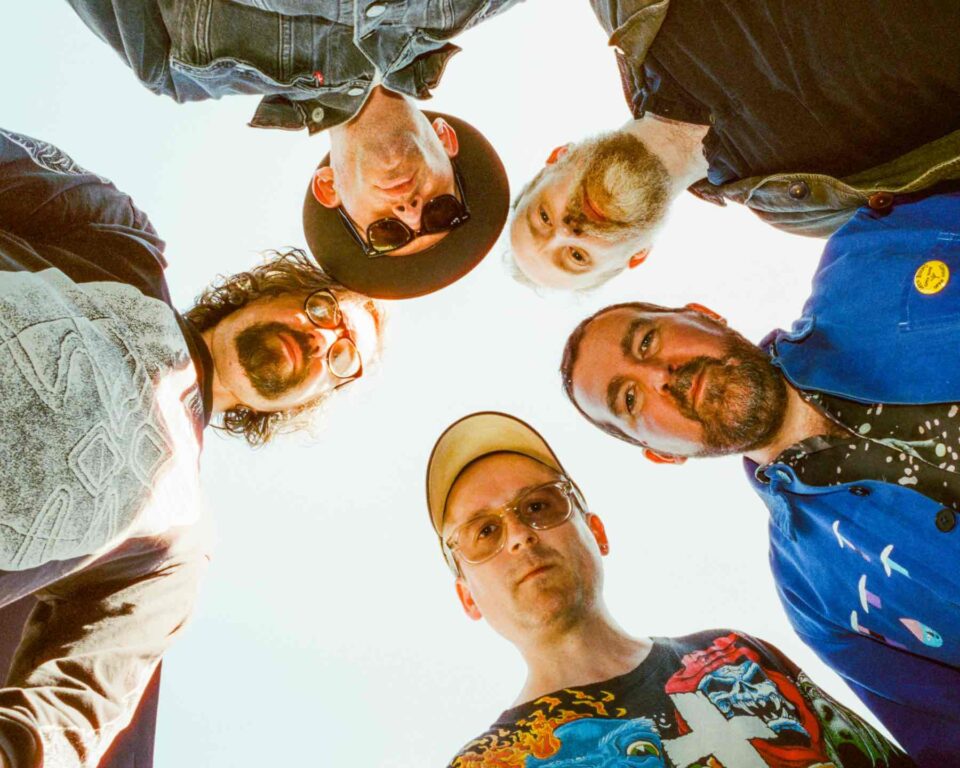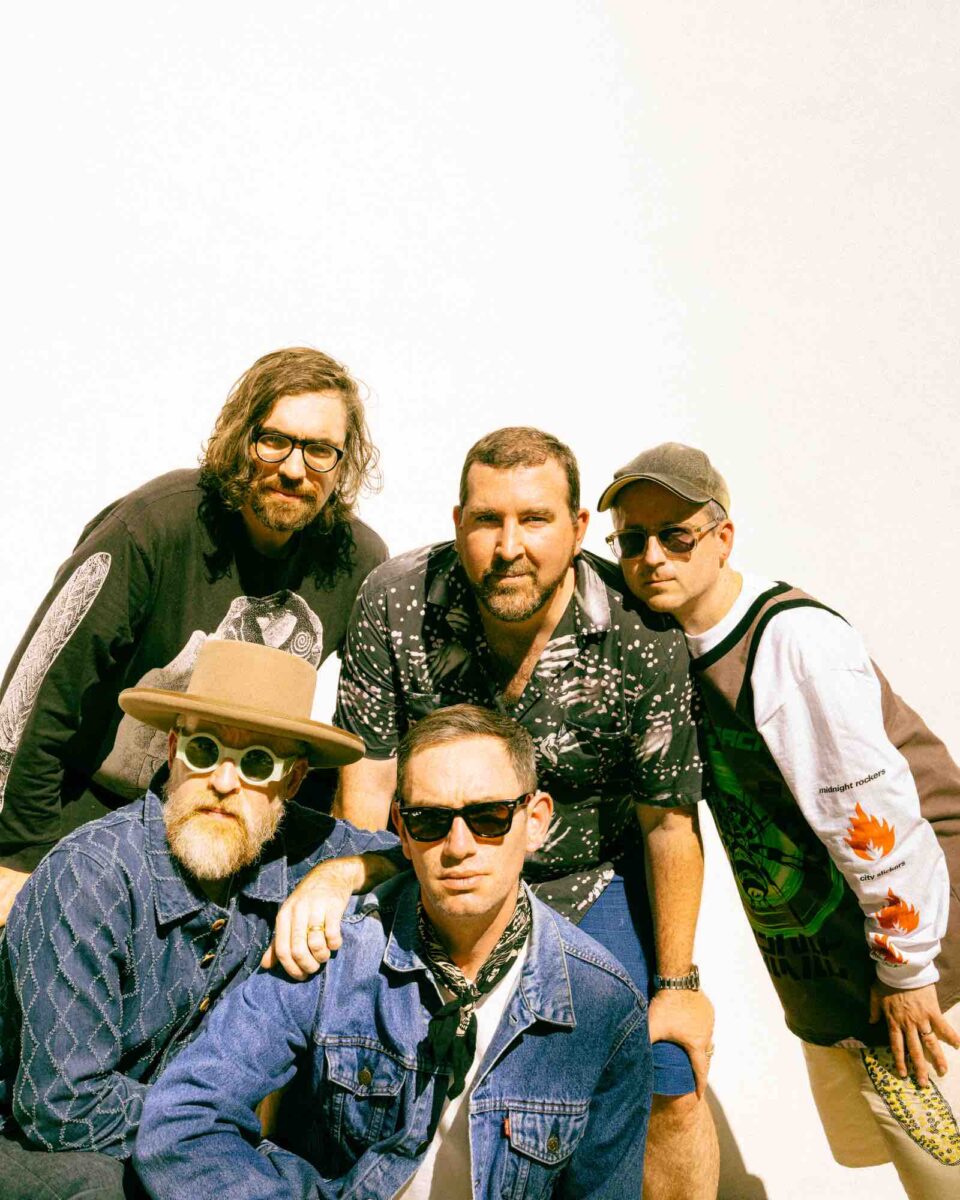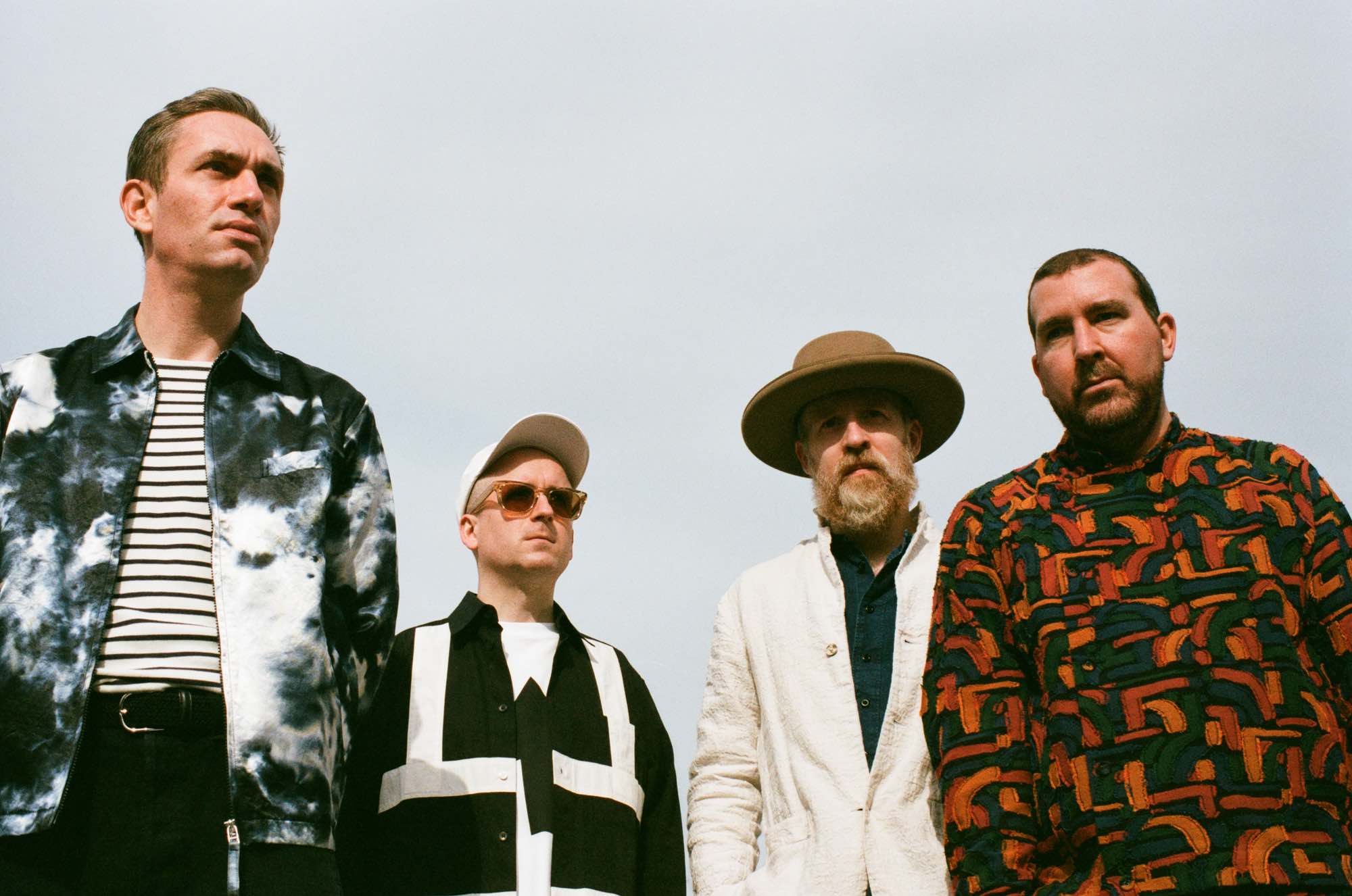It may seem like a distant memory for some of us, but a dancefloor can be a sexy, sweaty, and even a sad place—a microcosm of a relationship punctured by a bass heartbeat. Conversations can be loud, quiet, or only moved along by hips and lips. Hot Chip understand these languages.
The London-based dance-pop innovators’ eighth album is appropriately titled Freakout/Release, which announces a small step toward grittier dance tropes versus their usual electrified dance-pop. “Wild, beast, freakout, release!” snarls a vocoder as some menacing electro-funk beat writhes under another solid Alexis Taylor melody. This distortion shows a band willing to overturn a bit of their Pet Shop Boys exactitude with more of the dusty city grit of the Beastie Boys. Co-producers Soulwax certainly help with this effort as they link up again on the title track and “Down,” while Hot Chip’s Al Doyle built a proper studio in East London after the release of 2019’s A Bath Full of Ecstasy to escape a bit of the pressure cooker situations found in most studios.
We took some time to speak to Hot Chip co-founder Joe Goddard about the varied inspirations for the new album, how the band has changed since their younger days, and some possible future pop collaborations.
I read a little bit about some of the samples for one of the songs that kind of kicked off the creative portion with everybody working at the studio…
Yeah, that’s on the first track, “Down.” That has the sample of this great old Chicago disco song from Universal Togetherness Band, and that was sung by Andre Gibson, who’s in his seventies now. He joined us on stage in Chicago when we played there recently, and he was amazing. Without any rehearsal or anything, he just came on stage with us and sang that song and just smashed it. Sampling him and his group was the inspiration for where that track came from. It gave us a little bit of the creative impulse for some of the later tracks on the record as well, because we were interested in trying to bring a little bit more kind of grit, noise, and distortion into the music.
“[Universal Togetherness Band] gave us a little bit of the creative impulse for some of the later tracks on the record as well, because we were interested in trying to bring a little bit more kind of grit, noise, and distortion into the music.”
For instance, on “Freakout/Release,” I wrote the music initially in the midst of lockdown, when playing shows and everything else really felt very far away. It’s kind of a simple idea. I wanted to have one of these songs that works in the way that someone like Nirvana makes their music work, of having a riff that begins quiet and then becomes loud and jumps in volume for the choruses, which we’d never done before. I just thought that would be an exciting thing for us to do on stage at a festival.
It’s always funny to me the way people frame Hot Chip, almost disregarding the last three albums where you all matured, especially with the lyrics. Have you noticed that as you look back?
I think that is true. I guess people return to the tracks that kind of made the band’s name, like “Over and Over.” That’s usually the touchstone for people when they speak to us. I can understand that because those are the ones that kind of made the biggest cultural impact in the UK and the US. I know every artist says this in every interview, but we’re kind of more excited about what we’ve been doing more recently. I think Alexis has always been a great lyric writer, and he’s always been very passionate about making sure the songs work on multiple levels. But that has definitely developed and grown deeper and more nuanced as he’s gotten older.

That reminds me of the song “Eleanor.” If you just read the one line that you get from a press release about the inspiration of Samuel Beckett driving Andre the Giant to school, you think, “Oh, that’s a funny and kind of out-there song,” but it’s not like that in practice.
Yeah, and I think Alexis’ verse on that song is dealing with many kinds of darker problems between family members who have divided. I think that’s kind of the reason for Hot Chip’s longevity—the songs are relatively catchy, but there’s more going on lyrically, so you can kind of dig into that as you live with the music and lyrics.
For the songs that you contributed on the lyrical/production side, what were some of the things that you wanted to accomplish this time that were a little bit different than the last few records?
The last track, “Out of My Depth,” feels like something a little different to the stuff we’ve done in the past. It’s a little more orchestral—we got our friend Emma to write some great strings on that. For me, it brings to mind a little Brian Wilson. Even though it goes into a kind of German, motorik groove in the middle where we were referencing NEU! and things like that, the start and the end feel more like an orchestral folk kind of thing. That’s been an undercurrent in what Alexis writes right from the beginning. He’s enormously into country and folk music—we’ve been fans of stuff like Lambchop. Sometimes it’s not that obvious, because obviously we do more of this kind of uptempo synth-pop stuff.
“I think that’s kind of the reason for Hot Chip’s longevity—the songs are relatively catchy, but there’s more going on lyrically, so you can kind of dig into that as you live with the music and lyrics.”
“The Evil That Men Do,” I feel, is a slight departure for us as well. We were wanting to get into a more hip-hop sonic world for parts of that. There’s an amazing Jan Hammer Group track called “Don’t You Know,” which almost sounds like a hip-hop record but with these beautiful and mournful synths on it. And that was a massive reference on that track. It was really lovely to get Cadence Weapon involved, because he’s been a friend for a while. We toured with him in the US a while ago, and I’ve been listening to his most recent record. He was kind of doing a lot of songs that deal with modern political institutions, so I felt like it fit with the message of that song.
I wanted to ask about the studio that Al Doyle started up for the group. Tell me how that played a part for this record during the pandemic.
Al started building that place, I think, just prior to the pandemic. I started to kind of form a production duo with Al, and we’ve worked on several records in there together. We pooled our resources and started to work together, and then began to make the next Hot Chip record in that space, which was fantastic because we had zero time constraints at a minimal cost. We wanted to create an atmosphere like when you read about the Beastie Boys’ G-SON Studios, when they relocated to LA and made Check Your Head, and that period when they really created a relaxed and amazing space where they felt really comfortable.
For instance, “The Evil That Men Do” came out of a very improvised jam session where we were playing several sets together and recording everything. We had some really, really good times. It’s such an enjoyable part of making a record, the early stages when you don’t have any pressure to make all the difficult decisions you sometimes need to make to finish songs.
I wanted to go back a bit to those pressure-free days with Alexis. Tell me a little bit about how your relationships—and obviously your lives—have changed.
We would just spend a lot of our spare time with each other. Most days after school we would hang out for a few hours. We lived fairly close to each other, and we would walk down the hill from our secondary school to a really great independent record shop where we would spend a ton of time just going through all of their racks of vinyl, and then we would spend hours at my house hanging out and playing acoustic guitars. On weekends, we would meet up and go into the center of town to look for more records. Alexis was hunting for Prince bootleg tapes in Camden Market all the time. We’ve spent our whole lives together pretty much.
“It’s such an enjoyable part of making a record, the early stages when you don’t have any pressure to make all the difficult decisions you sometimes need to make to finish songs.”
If I fast-forward to now, we’re in completely different life situations where we have our children, we don’t have as much free time to just hang out with each other. I’m going to see Alexis and all the guys later tonight because we’re traveling to go play at a festival tomorrow, and I’m really looking forward to seeing everybody—I haven’t seen any of the guys for a couple of weeks at this point. I still send him music often. I sent him a track a couple days ago that could be a new Hot Chip thing or something else. And so even when we’re not making a record, we’re still doing that. We’re in a good place creatively, and I think we’re really excited about going back into this studio that we’ve created and just making stuff. We’re talking about just doing sessions in the next few months, just for fun really.
I know you’ve worked with Jarvis Cocker and Katy Perry and a few other folks on different projects. Are there any others in the works?
I don’t know what the outcome of it is going to be yet, but I did a couple of days working with Alison Goldfrapp recently, and I made a track with Róisín Murphy, and there have been a number of different artists that come to collaborate on new solo material with me. In terms of Hot Chip, we played a really exciting show recently as part of a Grace Jones–curated festival in London [called] Meltdown, and she asked us to collaborate with a bunch of Congolese musicians [Kasai Allstars]. We rehearsed for two days and then played a show together at the Royal Festival Hall in London, and then went into the studio with them a couple days after the gig to make some kind of collaborative music. The next thing we’re possibly going to do is try and finish off those tracks and maybe create an EP. FL








